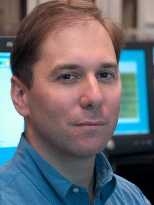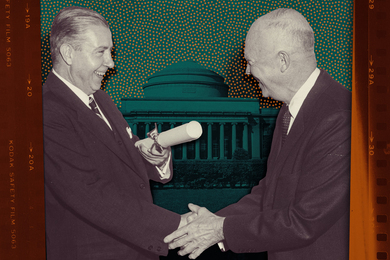Geneticist David Altshuler knows why he's not tall.
"I can blame my parents," he said while standing on a 6-inch-high podium to inaugurate the MIT Museum's new "Soap Box" series on science and technology, held in the museum's Robotics Gallery on Tuesday night, Nov. 15.
Altshuler's topic was science's rapidly developing knowledge of human genes. His good-natured parents were among 75 people who attended the salon-style lecture-conversation, part of an effort by new MIT Museum Director John Durant to move the museum "in the direction of becoming a meeting place to debate and exchange ideas."
Altshuler's joshing reference to height was a clever way into a complex topic. There are, after all, some 3 billion "base pairs," or letters, in the human genome -- the sum total of the genetic material in the chromosomes of an average person. (By comparison, there are about 6 million letters in the Bible.) Of those 3 billion letters, only 3 million vary from person to person. In their genetic essence, human beings are only one-tenth of 1 percent different from each other. And even less so when it comes to relatives.
"Height is heritable," Altshuler said, meaning the size of his parents was a very reliable determiner of his height as the offspring. But what else is heritable? Disease? IQ? Athletic skill? Altshuler (S.B. '86) would rather not hypothesize. He'd rather plug away at his HapMap project to try to identify those relatively few genetic variations that exist among people as a route to a better understanding of common diseases.
Altshuler, who is director of the Program in Medical and Population Genetics at the Broad Institute of MIT and Harvard, gave the example of age-related macular degeneration, a leading cause of visual impairment and blindness in the elderly. Thanks to genomic mapping, scientists know that a lone gene called "complement factor H" creates a higher risk for the condition. "Now, in trying to develop therapies, we can go right after a culprit gene," he said.
Understanding more variations, Altshuler believes, will lead to more culprit genes and more medical strides. But he also knows that isolating specific genes for depression, obesity or cancer might alter societal perceptions of those conditions. "How would people act if they knew a gene and not just what they eat made them fat?" he wondered.
At the "soap box" session, just such concerns were raised by the audience, who joined the fray after Altshuler's 45-minute presentation. Questions from the salon included: "How will parents restrain themselves from genetic selection" if they can learn so much about a child before birth?; and "What if a gene identified as a cause of disease has an unrealized positive effect?"
Altshuler may have had the soap box, but he didn't pretend to have the answers. He was, however, delighted to have prompted the questions. "Fear of unintended consequences is understandable, yes," he said, "but let's not forget that the promise of hopeful, desirable consequences is also there."
Altshuler is also an associate professor at Massachusetts General Hospital and Harvard Medical School.






